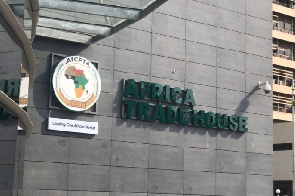Ghanaian Micro, Small and Medium Enterprises (MSMEs) have been advised to increase their knowledge and adoption of digital solutions to reap the benefits of the African Continental Free Trade Area (AfCFTA) initiative.
This comes on the heels of a study, which found that about 37.8 per cent of MSMEs across the country were familiar with the AfCFTA initiative, with 14 per cent well-informed of the protocols on digital trading under the pact.
The study, “Digital Trade and E-commerce: connect the missing links, was a German Development Cooperation (Gesellschaft für Internationale Zusammenarbeit, GIZ) initiative.
It received support from various stakeholders, including the National Coordination Office of the AfCFTA Secretariat, Association of Ghana Industries (AGI), and the Ghana Chamber of Agribusiness.
A Huawei and Exford Economics study has noted that the global digital economy, worth US$11.5 billion in 2016, would reach 25 per cent of global Gross Domestic Product (GDP) by 2030.
The AfCFTA, one of African Union’s (AU) Agenda 2063 flagship programmes, and the world’s largest free trade area by member states is also estimated to generate US$450bn in income by 2035.
That, Professor Godfred Alufar Bokpin, an Economist and Lead Consultant for the study in an interview with the Ghana News Agency, said presented enormous opportunities for trade and e-commerce under AfCFTA for MSMEs.
“What they [MSMEs] need to know is that the future of the digital economy will be greater, more enabling and profitable than the traditional economy, and today it’s easier and cheaper to find people online than in physical locations,” he said.
He, therefore, encouraged MSMEs to brighten their online presence, and strike a good balance about investing in the physical presence of their business and that of social media and other digital platforms.
“While investing in your shops, you must as well as invest in beautifying your online presence and make sure that the risk that comes along with online trade is properly managed,” he said.
Prof Bokpin advised MSMEs to also reach out to the appropriate institutions, including the Ghana Fintech and Payments Association, the Bank of Ghana (BoG) for regulatory and online security support.
“The future of money, business, and economies is increasingly digital, and it is the private sector that will continue to drive growth. It is important that they’re empowered and given the necessary support to move their goods and services across the borders of this country,” he said.
Dr Kenneth Ashigbey, Chief Executive Officer (CEO), Ghana Chamber of Telecommunications, said the time had come for the sector to be treated as a utility due to its growing importance in digital trade and e-commerce.
He called for a stakeholder collaboration to ensure the that the cost of data is made affordable, particularly for MSMEs to enhance their participation in the intra-continental free trade.
“If we want our MSMEs to thrive, then we should not have 4G network only in the capitals, but extended for everyone to have access, by looking at the various elements in the cost of production and make them business friendly,” he said.
Business News of Saturday, 23 March 2024
Source: GNA













